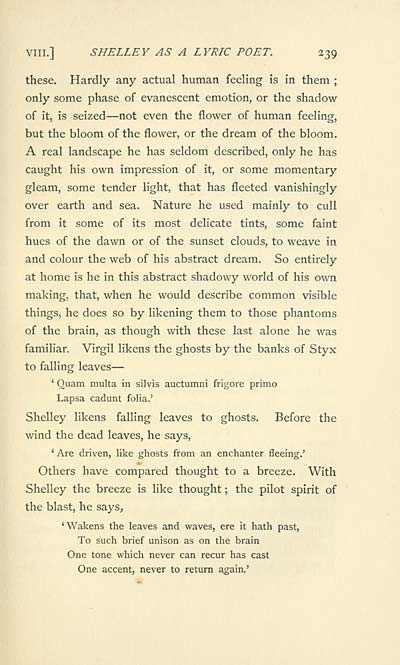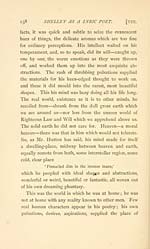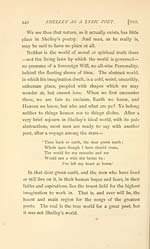Ossian Collection > Aspects of poetry
(255)
Download files
Complete book:
Individual page:
Thumbnail gallery: Grid view | List view

VIII.] SHELLEY AS A LYRIC POET. 239
these. Hardly any actual human feeling is in them ;
only some phase of evanescent emotion, or the shadow
of it, is seized — not even the flower of human feeling,
but the bloom of the flower, or the dream of the bloom.
A real landscape he has seldom described, only he has
caught his own impression of it, or some momentary
gleam, some tender light, that has fleeted vanishingly
over earth and sea. Nature he used mainly to cull
from it some of its most delicate tints, some faint
hues of the dawn or of the sunset clouds, to weave in
and colour the web of his abstract dream. So entirely
at home is he in this abstract shadowy world of his own
making, that, when he would describe common visible
things, he does so by likening them to those phantoms
of the brain, as though with these last alone he was
familiar. Virgil likens the ghosts by the banks of Styx
to falling leaves —
' Ouam multa in silvis auctumni frigore primo
Lapsa cadunt folia.'
Shelley likens falling leaves to ghosts. Before the
wind the dead leaves, he says,
' Are driven, like ghosts from an enchanter fleeing.'
Others have compared thought to a breeze. With
Shelley the breeze is like thought; the pilot spirit of
the blast, he says,
'Wakens the leaves and waves, ere it hath past,
To such brief unison as on the brain
One tone which never can recur has cast
One accent, never to return again.'
these. Hardly any actual human feeling is in them ;
only some phase of evanescent emotion, or the shadow
of it, is seized — not even the flower of human feeling,
but the bloom of the flower, or the dream of the bloom.
A real landscape he has seldom described, only he has
caught his own impression of it, or some momentary
gleam, some tender light, that has fleeted vanishingly
over earth and sea. Nature he used mainly to cull
from it some of its most delicate tints, some faint
hues of the dawn or of the sunset clouds, to weave in
and colour the web of his abstract dream. So entirely
at home is he in this abstract shadowy world of his own
making, that, when he would describe common visible
things, he does so by likening them to those phantoms
of the brain, as though with these last alone he was
familiar. Virgil likens the ghosts by the banks of Styx
to falling leaves —
' Ouam multa in silvis auctumni frigore primo
Lapsa cadunt folia.'
Shelley likens falling leaves to ghosts. Before the
wind the dead leaves, he says,
' Are driven, like ghosts from an enchanter fleeing.'
Others have compared thought to a breeze. With
Shelley the breeze is like thought; the pilot spirit of
the blast, he says,
'Wakens the leaves and waves, ere it hath past,
To such brief unison as on the brain
One tone which never can recur has cast
One accent, never to return again.'
Set display mode to: Large image | Transcription
Images and transcriptions on this page, including medium image downloads, may be used under the Creative Commons Attribution 4.0 International Licence unless otherwise stated. ![]()
| Early Gaelic Book Collections > Ossian Collection > Aspects of poetry > (255) |
|---|
| Permanent URL | https://digital.nls.uk/78388332 |
|---|
| Description | Selected books from the Ossian Collection of 327 volumes, originally assembled by J. Norman Methven of Perth. Different editions and translations of James MacPherson's epic poem 'Ossian', some with a map of the 'Kingdom of Connor'. Also secondary material relating to Ossianic poetry and the Ossian controversy. |
|---|
| Description | Selected items from five 'Special and Named Printed Collections'. Includes books in Gaelic and other Celtic languages, works about the Gaels, their languages, literature, culture and history. |
|---|

